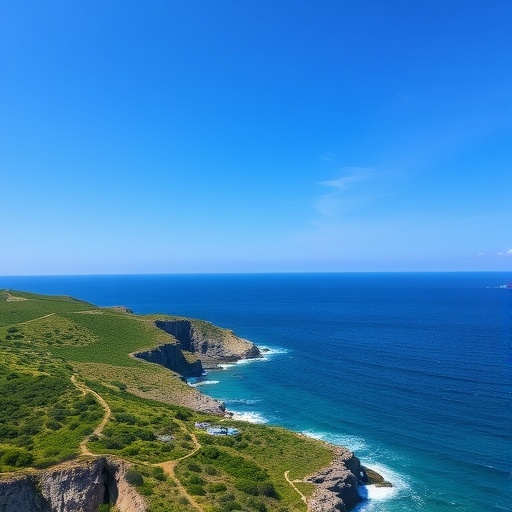Leading experts in maritime engineering, marine ecology, and biodiversity convened in Barcelona from October 7 to 9 to inaugurate the ambitious COAST-SCAPES project, a bold initiative aimed at reshaping coastal resilience in the face of climate change. Hosted by the Maritime Engineering Laboratory of the Polytechnic University of Catalonia, this assembly marked the official launch of a project designed to devise systemic, science-driven strategies that can safeguard and restore coastal landscapes. The meeting’s primary goal was to align the multifaceted scientific, technical, and communication strategies underpinning the project and foster dynamic collaboration between partners across Europe, Africa, and Latin America.
During the intensive two-day summit, representatives from the diverse COAST-SCAPES consortium introduced their institutions’ respective roles in the project’s collective vision. Each partner elaborated on their unique expertise and contributions, forming an integrated knowledge network vital for constructing scalable coastal adaptation frameworks. The project’s coordinator, Professor Manel Grifoll, steered comprehensive dialogues focused on setting critical milestones and deliverables, while identifying future technical and environmental challenges. Central to these conversations was the delineation of Core and Replicating Pilots, which constitute the strategic backbone enabling the development of replicable, locally tailored resilience solutions that can be scaled and exported beyond pilot locations.
Initiated officially on September 1, 2025, the COAST-SCAPES project embodies an interdisciplinary approach to restore and fortify coastal ecosystems that are increasingly vulnerable to accelerating climatic stressors. The project’s scientific agenda includes the co-design of integrated resilience indicators and the development of advanced climate early-warning systems. These innovations will support proactive management and strategic decision-making in coastal environments by incorporating cutting-edge monitoring technologies and predictive models. By leveraging these tools, COAST-SCAPES aspires to reduce climate-induced risks and improve the understanding of land-sea interactions critical for sustainable coastal management.
At its core, COAST-SCAPES emphasizes the importance of nature-based solutions (NbS) to foster biodiversity conservation and reduce the environmental footprint of human activities under conditions of natural resource scarcity. NbS approaches prioritize the restoration and sustainable management of coastal habitats such as wetlands, dunes, and seagrass meadows, which serve as natural buffers against extreme weather events and contribute to carbon sequestration. This nature-centric paradigm challenges traditional engineered coastal defenses by investing in ecosystem services that enhance resilience while maintaining ecological integrity.
The consortium represents a diverse coalition of research institutions, universities, and technology organizations spanning Europe, Africa, and Latin America, forming a global alliance poised to address coastal vulnerabilities through a systems thinking perspective. Human intervention has significantly disrupted natural coastal evolution, rendering these ecosystems fragile and functionally impaired. By prioritizing low-carbon adaptation strategies, COAST-SCAPES harnesses ecological processes that mitigate climate risks while simultaneously safeguarding biodiversity and ecosystem services vital for human well-being.
Professor Manel Grifoll articulated the project’s transformative vision: “COAST-SCAPES is a collective effort to rethink how we coexist with coastal systems. By integrating natural processes, technology, and community knowledge, we aim to create adaptive landscapes that safeguard biodiversity and support sustainable livelihoods.” His statement underscores the project’s holistic framework, which blends ecological science with socio-economic and cultural dimensions to construct resilient coastal systems capable of thriving amid escalating climate pressures.
A central element of COAST-SCAPES is its Core Pilots, including the Mar Menor lagoon in the Iberian Peninsula, which will serve as real-world testbeds for implementing comprehensive resilience plans. These pilots will provide empirical evidence for large-scale adaptation, balancing ecological preservation with infrastructural modernization. Addressing existing challenges such as degraded water quality, habitat loss, and anthropogenic infrastructure constraints requires innovative engineering solutions combined with robust governance models that promote participatory stakeholder engagement.
The project’s strategy hinges on social and technical innovation, advocating a governance shift that facilitates cross-sectoral collaboration among scientists, policymakers, industry leaders, environmental activists, and local communities. This participatory model fosters knowledge exchange and ensures that resilience interventions align with local realities and socio-economic needs. By bridging these diverse groups, COAST-SCAPES promotes integrative stewardship of coastal landscapes that accommodates both ecological functions and human activities.
Fundamentally, COAST-SCAPES reinforces the critical role of coastal restoration as a pivotal climate adaptation strategy. Coastal ecosystems, long undervalued and threatened by unsustainable practices, offer multiple co-benefits including carbon storage, storm protection, and habitat provision. The project’s integrated approach acknowledges the interconnectedness of land and sea, with restoration efforts targeting systemic enhancements of landscape connectivity and ecological resilience.
Innovations developed through COAST-SCAPES will incorporate advanced sensor networks, remote sensing technologies, and data analytics to monitor environmental changes in real time. Proactive climate warning systems aim to provide early alerts for extreme events such as storms, sea-level rise, and flooding, enabling timely responses and adaptive management. These technological advancements synergize with ecosystem-based approaches, creating a robust and adaptive framework for climate-resilient coastal landscapes.
In summary, COAST-SCAPES represents a cutting-edge interdisciplinary initiative that leverages collaborative science, technological innovation, and community-driven governance to redefine the future of coastal resilience. The project’s vision extends beyond mere survival—aiming to cultivate thriving coastal ecosystems that support biodiversity, sustain livelihoods, and offer scalable solutions to global climate challenges. With rigorous science and participatory methods at its core, COAST-SCAPES exemplifies a forward-looking paradigm essential for confronting the unprecedented threats facing vulnerable coastal regions worldwide.
Subject of Research: Climate-resilient coastal landscapes and systemic land-to-sea climate adaptation solutions.
Article Title: COAST-SCAPES: Pioneering Interdisciplinary Resilience Strategies for Climate-Adapted Coastal Systems.
News Publication Date: Information not provided.
Web References: Information not provided.
References: Information not provided.
Image Credits: COAST-SCAPES
Keywords: Climate change, Climate sensitivity, Climate change mitigation, Climate change adaptation, Climatology




